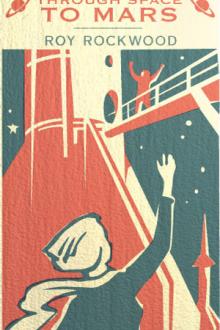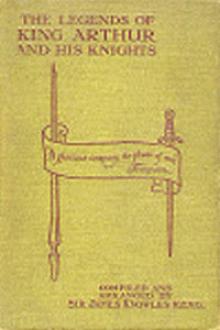Lost on the Moon by Roy Rockwood (best fiction novels .txt) 📕

- Author: Roy Rockwood
- Performer: -
Book online «Lost on the Moon by Roy Rockwood (best fiction novels .txt) 📕». Author Roy Rockwood
for ten minutes.
They swerved in that direction, and, after keeping on that trail for
some time, and becoming more and more convinced that it was the wrong
one, they turned to the right. That did not bring them to familiar
ground, and there was no sight of the projectile.
“Let’s go straight ahead,” suggested Andy, after a puzzled pause. “I
think that will be best.”
“Well, which way is straight ahead?” asked Mark.
“That’s so, it is hard to tell,” admitted the hunter. “I wish I hadn’t
lost that compass.”
They wandered about for an hour longer. They could seem to make no
progress, though they covered much ground. Suddenly Jack called out:
“Say, we’ve been going around in a circle!”
“In a circle?” asked Mark.
“Yes,” went on his chum. “Here’s the very rock I sat down on a while
ago. I remember it, for I scratched my initials on it.”
Jack pointed out the letters. There was no disputing it. They had made
a complete circle. For a moment they maintained silence in the face of
this alarming fact. Then Mark exclaimed:
“I guess we’re lost!”
“Lost on the moon!” added Jack, in an awestruck voice, and he gazed on
the chill and desolate scene all about them; the great pinnacles of
rocks, in fantastic form; the immense black caverns of craters on
either hand; the sickly green vegetation.
“Lost on the moon!” whispered Mark, and there was not even an echo of
his voice to keep them company. Only a chill, desolate silence!
DESOLATE WANDERINGS
For a moment the three stood helplessly there and stared at each other.
They could scarcely comprehend their situation at first. Then, with a
glance at the cold and quiet scene all about them, a look up at the
sun, which was the only cheerful object in the whole landscape, Jack
observed: “Oh, I say, come on now, don’t let’s give up this way! We
have only taken a wrong turn, and I’ll wager that the projectile will
be just around the corner. Come on,” and he started off.
“Yes,” said Mark, “that’s the trouble. There are so many corners, and
we have taken so many wrong turns, that we’re all confused. I think the
best thing to do will be to stay here a while and pull ourselves
together.”
“That’s right,” spoke old Andy. “Many a time in the woods I’ve got all
confused-like, and then I’d sit down and think, and I’d get on the
right path in a few minutes after.”
“The trouble here is,” said Jack, “that there are no woods. If there
were we might know how to get out of them. But think of it! Lost on
the moon, in the midst of a whole lot of queer mountain peaks, and big
holes that would hold half a dozen cities of the United States at the
same time, and never know it! This is a fearful place to be lost in!”
“I’m not going to admit that we’re lost,” declared Mark stoutly.
“Hu! You’re like the Indian,” spoke Jack. “The Indian who got lost in
the woods. He insisted that it wasn’t he who was lost, that it was his
wigwam that couldn’t be found. He knew where he himself was all the
while. That’s our case, I suppose. We’re here, but the projectile is
lost.”
“Ha! ha!” laughed Andy Sudds. “That’s a pretty good joke!”
“But not being able to find the projectile is no joke,” went on Mark,
who always took matters more seriously than did his chum. “What are we
going to do?” he added. “We can’t stay here like this.”
“Maybe we’ll have to,” declared Jack. “We certainly can’t get off the
moon—at least, not until we reach the projectile, and I’d like to
discover those diamonds before we go back.”
“Hu! Those diamonds!” exploded Mark. “I think this whole thing is a
wild-goose chase, anyhow! If it hadn’t been for those diamonds we
wouldn’t have come to the moon. I don’t believe there are any diamonds
here, anyhow.”
“Well, I can’t prove it to you now, but I will before we get back,”
asserted Jack. “We’ll be wearing diamonds, as the song says.”
“Diamonds aren’t going to keep us warm when we’re freezing,” went on
Mark, who seemed bound to look on the dark side, “and we can’t eat ‘em
when we’re hungry. A lot of good they’ll do us if we do find them!”
“Oh, cheer up!” suggested Jack cheerfully. “And, speaking of eating,
what’s the matter with having some lunch? What did we bring it along
for if we’re not going to eat? Let’s begin.”
His good spirits were contagious, not that Andy needed any special
cheering up, but Mark did. In a few minutes they were seated on some
rugged rocks, and, with their life-torches stuck in cracks, so that the
perforated metal boxes of chemicals would be on a level with their
faces, they opened the baskets they had been fore-sighted enough to
bring with them.
“Why, I feel better already,” asserted Jack, as he munched some
sandwiches which Washington White had made. “As soon as we’ve finished
we’ll have another hunt for the projectile, and I’ll wager that we’ll
find it.”
“I wouldn’t finish if I were you,” suggested Andy, who was eating
sparingly.
“Finish what?” asked Jack.
“All your lunch. You see,” the old hunter went on, “we may find the
projectile, and, again, we may not. I’m inclined to think we’re not so
very far from it, but we may be some time locating it in among all
these peaks and craters. So it will be the best plan to save some of
our lunch and drinking water until—well, until we’re hungry again,”
and he carefully put back into his basket the remains of the food.
“You don’t mean to say you think we’ll be all day finding the
Annihilator, do you?”
Jack paused, with a sandwich half way to his mouth as he asked this
question.
“Well, it’s best to be on the safe side,” spoke Andy guardedly. “We may
find it, and, again, we may not. Save your powder against the time of
need, I say—by powder meaning victuals and drink. We can’t drop in a
restaurant up here, and I don’t see much game to shoot, and I should
hate to eat such fodder as this,” and he poked with his foot some
sickly green vines, growing on the ground.
The boys’ faces, which had become more cheerful, assumed a serious
look. Jack stopped eating at once and placed back in the basket his
remaining sandwiches. He also corked up the bottle of water, which was
kept from freezing by means of a fur pouch in which it was carried.
“If there’s a possibility of being lost some time,” spoke Mark, “we’d
better figure out just how long our food will last,” and he examined
the contents of his basket.
Fortunately Washington White, with a knowledge of the appetites of the
chums, had filled the baskets with lavish hands. There was, they found,
food enough to last them three days, if they ate sparingly, and there
was enough water for half that time, providing they only took small
sips when thirsty. But they had noticed, in one or two places, little
pools of liquid, which they had not tasted, but which might prove to be
drinking water. Certainly they would need more if they were destined to
remain away from the projectile for very long.
“Well, then,” observed Mark, when the food calculation was over, “it
appears that we can remain lost for about three days, at the most.”
“Oh, but we’ll be back home—I mean in the projectile—long before
that,” declared Jack.
“I wish I was sure of that,” murmured Andy with a dubious shake of his
head.
“Well, let’s move on again,” suggested Jack. “We feel better now, and
maybe we’ll have better luck.”
They started off, tramping over the rugged surface of the moon, while
the sun shone with tepid heat down on them. They had to go this way and
that to avoid the immense fissures in the ground or the yawning
craters, which loomed deep, and in awful silence, in their path.
Sometimes they climbed small mountains or crawled in and out of small
craters, slipping and stumbling.
They were not cold, for their fur garments kept them comfortably warm,
and there was no wind to make the freezing temperature search through
the crevices of their clothing. But it was the desolate silence, the
utter absence of any form of life save the pale green vegetation that
got on their nerves. It was like being in a dead world—on a planet
that seemed about to dissolve into space.
They began their further search for the projectile with hope in their
hearts, but this gradually gave way to despair as they wandered on over
the desolate surface, and saw nothing but the same rugged peaks, the
same yawning caverns and the innumerable craters, large and small.
On they wandered, looking on all sides for the missing projectile, but
they had no glimpse of it. Even climbing to one of the high peaks,
whence they had a view of the surrounding country, afforded them no
trace of the Annihilator, They were utterly lost.
Old Andy, who, by reason of his experience as a trapper and hunter, had
taken the lead, came to a halt. He looked around helplessly. He did not
know what to do.
“Well, boys,” he remarked at length, “I don’t like to say it, but I
can’t seem to get anywhere. I give up.”
“Give up?” murmured Jack, in blank dismay.
“Yes, for the time being,” said the old man. “I’m all played out. I
guess we all are. We must have a rest. Here’s a sort of cave. Let’s
crawl in and have a sleep. Then maybe we can do something to-morrow—
no, not to-morrow, for they don’t have that on the moon, where the day
is fourteen days long—but after we sleep we may be able to find our
way back. Anyhow, I’ve got to get some sleep,” and without another word
the old hunter went into the cave, and, fixing his life-torch near his
head, where the fumes from it would dissipate the poisonous gases of
the moon, he closed his eyes, and was soon in slumber.
“I—I guess we’d better do the same,” said Jack, and Mark nodded. They
were both sick at heart.
THE PETRIFIED CITY
For a time, after they had entered the cave, which was in the side of a
rugged mountain, the boys talked in low tones of their perilous
situation. For that it was perilous they both knew. Had they been on
the earth, lost in some desolate part of it, away from civilization,
their plight, would have been bad enough with what little food they
possessed.
But on the far-off moon—the dead moon, which contained no living
creatures save themselves, as far as they could tell—with no form of
animal life that might serve to keep them from starving, with only the
scantiest of vegetation, their situation was most deplorable.
“And then there’s another thing,” said Mark, as if he was cataloguing a
list of their troubles.
“What is it?” asked Jack. “I guess we have all the troubles that belong
to us, and more, too.”
“Well, what are we going to do when the life-torches give out, and we
can’t breathe any more?” asked Mark dubiously.
“Well, I guess it’ll be all up





Comments (0)